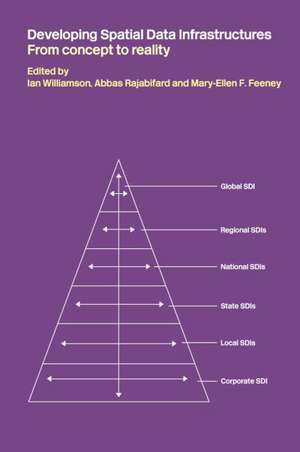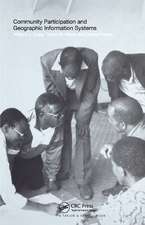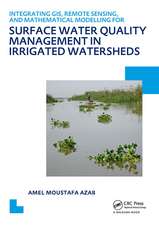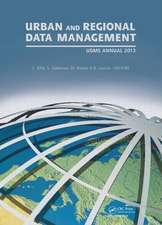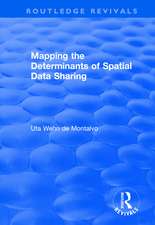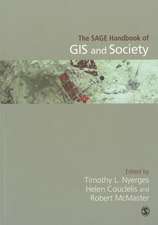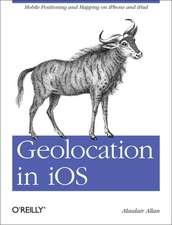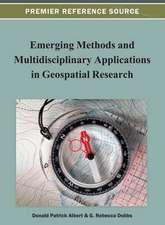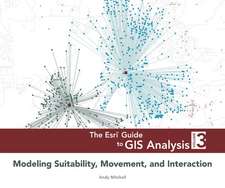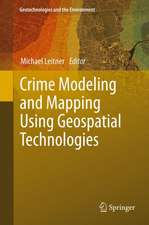Developing Spatial Data Infrastructures: From Concept to Reality
Editat de Ian P. Williamson, Abbas Rajabifard, Mary-Ellen F. Feeneyen Limba Engleză Hardback – 10 iul 2003
The spatial data infrastructure (SDI) concept continues to evolve and become an increasingly important element of the infrastructure that supports economic development, environmental management, and social stability. Because of its dynamic and complex nature, however, it remains a fuzzy concept to many, and depending on their needs and circumstances, practitioners, researchers, and governments adopt different views of it.
Developing Spatial Data Infrastructures: from Concept to Reality makes a timely contribution to the theory and practice of SDIs and breaks new ground in improving understanding of their relevance and value. It provides expert overviews of policies, concepts, standards, and practices associated with the design, implementation, and operation of SDIs. It introduces the concept of an SDI Hierarchy based on Hierarchical Spatial Reasoning, sets out the similarities and differences between SDIs operating within and between different jurisdictions, and identifies factors key to the success of SDI initiatives.
Built on key contributions to the International Symposium on Spatial Data Infrastructure held in Melbourne in November 2001, this book is the first of its kind to provide address both the theoretical and practical aspects of developing appropriate SDIs. It offers unique, detailed discussions on the challenges and direction of future SDI development and thus provides an outstanding resource for those involved in building and maintaining SDIs and for GIS professionals and students.
| Toate formatele și edițiile | Preț | Express |
|---|---|---|
| Paperback (1) | 461.03 lei 6-8 săpt. | |
| CRC Press – 9 aug 2018 | 461.03 lei 6-8 săpt. | |
| Hardback (1) | 1284.62 lei 6-8 săpt. | |
| CRC Press – 10 iul 2003 | 1284.62 lei 6-8 săpt. |
Preț: 1284.62 lei
Preț vechi: 1566.61 lei
-18% Nou
Puncte Express: 1927
Preț estimativ în valută:
245.87€ • 265.40$ • 206.16£
245.87€ • 265.40$ • 206.16£
Carte tipărită la comandă
Livrare economică 19 aprilie-03 mai
Preluare comenzi: 021 569.72.76
Specificații
ISBN-13: 9780415302654
ISBN-10: 041530265X
Pagini: 348
Ilustrații: 75 line drawings, 50 b&w photographs, 25 tables
Dimensiuni: 156 x 234 x 21 mm
Greutate: 0.8 kg
Ediția:1
Editura: CRC Press
Colecția CRC Press
ISBN-10: 041530265X
Pagini: 348
Ilustrații: 75 line drawings, 50 b&w photographs, 25 tables
Dimensiuni: 156 x 234 x 21 mm
Greutate: 0.8 kg
Ediția:1
Editura: CRC Press
Colecția CRC Press
Public țintă
ProfessionalCuprins
SDIs. Spatial Data Infrastructures: Concept, Nature And SDI Hierarchy. Global Initiatives. Regional SDIs. Regional SDI Diffusion. National SDI Initiatives. State SDI Initiatives. State SDI Development: A Victorian Perspective. SDI Development: Roles of Local and Corporate SDIs. Sustainable Development, the Place for SDIs and the Case for E-Governance. Spatial Data Infrastructures and Decision-Support. Financing Spatial Data Infrastructure Development: Examining Alternative Funding Models. Developing Evaluation and Performance Indicators for SDIs. Administrative Boundary Design in Support of SDI Objectives. SDI and Location Based Wireless Applications. SDI and Positional Accuracy. Future Direction for SDI Development.
Notă biografică
Professor Ian P. Williamson, is the Professor of Surveying and Land Information, Head, Department of Geomatics, and Director, Centre for Spatial Data Infrastructures (SDI) and Land Administration, at The University of Melbourne. His teaching and research is in the areas of cadastral, land and geographic information systems, land administration and SDI and he advises state and federal government, UN agencies and The World Bank in these areas. He was Chairperson of Commission 7 (Cadastre and Land Management) of the International Federation of Surveyors 1994-98, and is the current Director for United Nations Liaison for the FIG. He is also Chairperson of Working Group 3 (Cadastre) of the United Nations-sponsored Permanent Committee on Geographic Information Systems Infrastructure for Asia and the Pacific 2001-2004.
Dr Abbas Rajabifard, is Deputy Director of Centre for SDI and Land Administration, and a Research Fellow in the Department of Geomatics, The University of Melbourne. He holds PhD (Melb), MSc (ITC), Postgrad-Dipl (ITC), and BSurv (Tehran). He worked for the National Cartographic Centre (NCC), Iran (1990-98), where he was Head of the GIS Department, managing the National Topographic Database and National GIS in Iran. From 1994-1999 he has been an Executive Board member and National representative to the Permanent Committee on GIS Infrastructure for Asia and the Pacific (PCGIAP). Since then he has been an active member of WG2 and is now Research coordinator in PCGIAP-Working Group 3. He has also been a member of the International Steering Committee for Global Mapping 1997-2001.
Ms Mary-Ellen F. Feeney, is completing her PhD at the Centre for SDI and Land Administration, The University of Melbourne. She is involved in lecturing, tutoring and course development in a number of subjects and has research interests in the development of SDI to support decision making at local through national levels. She is a member of the Global SDI and Decision Support System (DSS) Working Group. She holds BSc App.Geog.(Hons) (NSW), completing her research with the Commonwealth Science and Industry Research Organisation (CSIRO) and University of NSW in 1997. She has held positions as CSIRO Research Assistant (1996-1997), Australian Hydrographic Service Cartographer (1998) and Technical Development Officer (1998-1999), and has been involved in the development of the Australian Digital Hydrographic Database, GIS infrastructure and capacity building for the Department of Defence.
Dr Abbas Rajabifard, is Deputy Director of Centre for SDI and Land Administration, and a Research Fellow in the Department of Geomatics, The University of Melbourne. He holds PhD (Melb), MSc (ITC), Postgrad-Dipl (ITC), and BSurv (Tehran). He worked for the National Cartographic Centre (NCC), Iran (1990-98), where he was Head of the GIS Department, managing the National Topographic Database and National GIS in Iran. From 1994-1999 he has been an Executive Board member and National representative to the Permanent Committee on GIS Infrastructure for Asia and the Pacific (PCGIAP). Since then he has been an active member of WG2 and is now Research coordinator in PCGIAP-Working Group 3. He has also been a member of the International Steering Committee for Global Mapping 1997-2001.
Ms Mary-Ellen F. Feeney, is completing her PhD at the Centre for SDI and Land Administration, The University of Melbourne. She is involved in lecturing, tutoring and course development in a number of subjects and has research interests in the development of SDI to support decision making at local through national levels. She is a member of the Global SDI and Decision Support System (DSS) Working Group. She holds BSc App.Geog.(Hons) (NSW), completing her research with the Commonwealth Science and Industry Research Organisation (CSIRO) and University of NSW in 1997. She has held positions as CSIRO Research Assistant (1996-1997), Australian Hydrographic Service Cartographer (1998) and Technical Development Officer (1998-1999), and has been involved in the development of the Australian Digital Hydrographic Database, GIS infrastructure and capacity building for the Department of Defence.
Descriere
Developing Spatial Data Infrastructures: from Concept to Reality provides an overview of SDI policies, concepts, and standards and practices associated with the design, implementation, and operation of an SDI. It identifies key factors, such as socio-political, economic, and cultural issues that influence the success of SDI initiatives and introduces the concept of an SDI hierarchy based on hierarchical spatial reasoning. It builds on an International Symposium on Spatial Data Infrastructure held in Melbourne by presenting a series of alternative long-term visions and identifying many of the forces for change. Both professionals and students will find this book useful.
